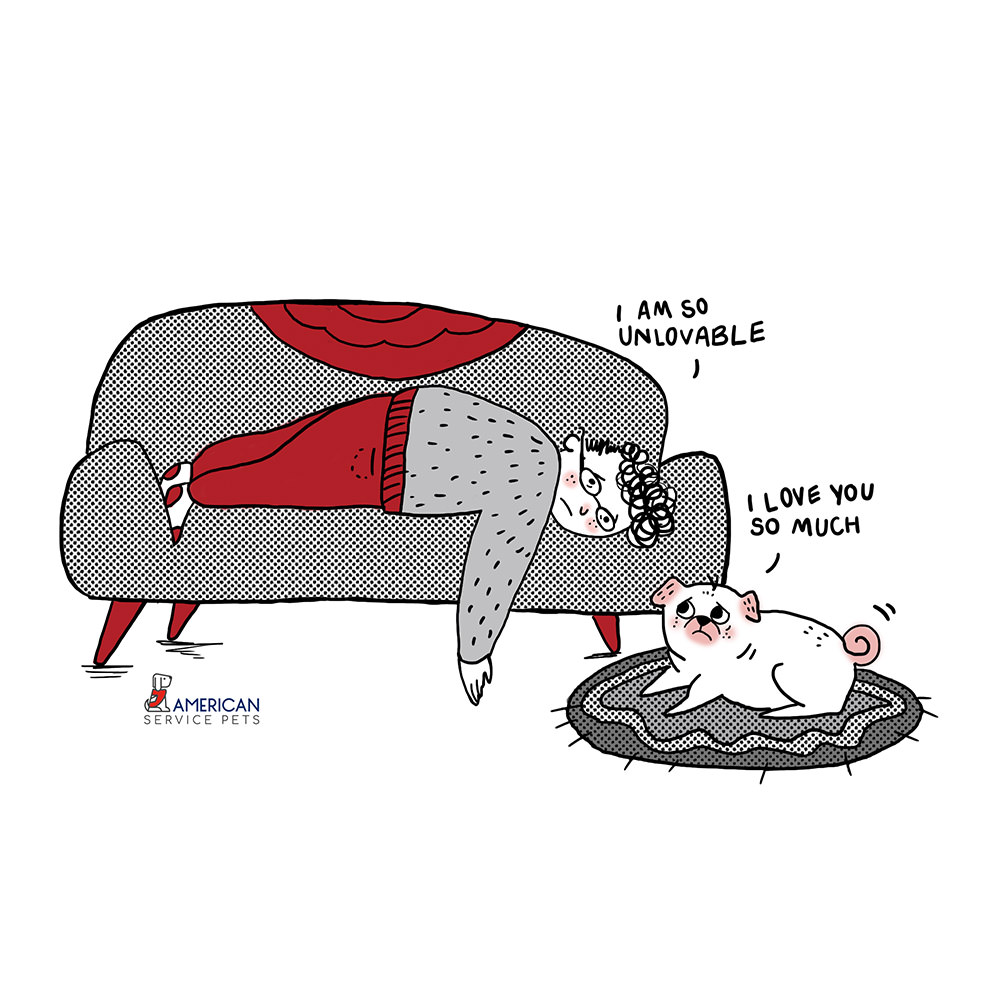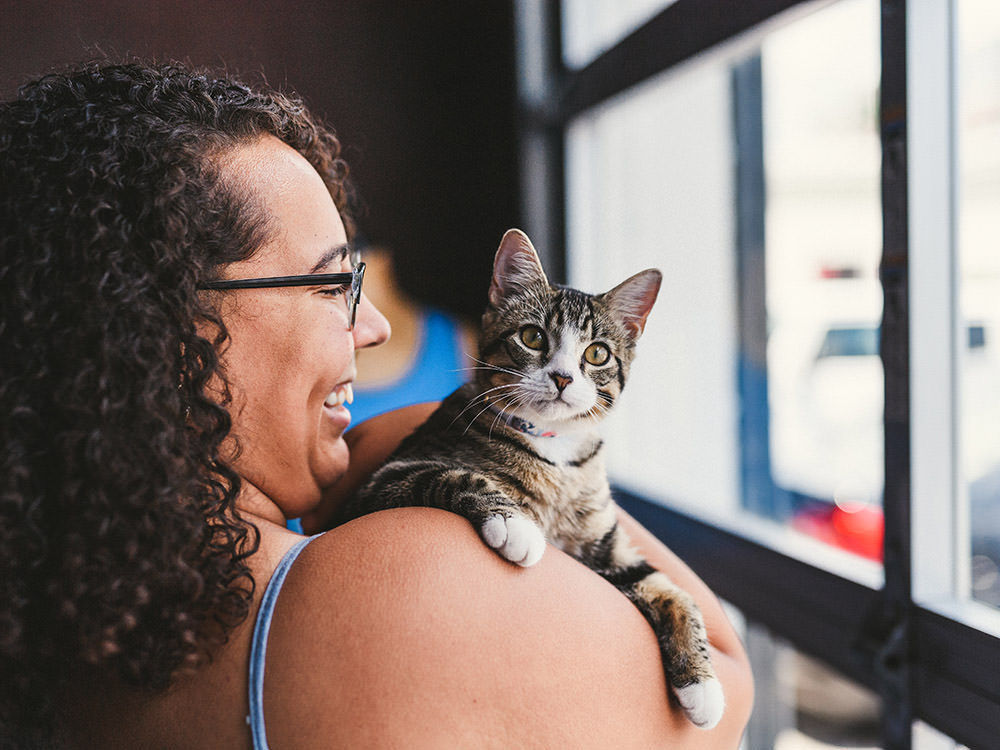
All the Furry Details on Emotional Support Animals
- Published on:
- By: ASP Team
Have you ever experienced the joy and comfort pets bring to daily life? We get it, you and your emotional support Animal are kindred spirits.
A few “I missed you” licks and cuddles after a long, stressful day at work can be just the thing to make it all better. Try not to smile after a greeting like that! Maybe a happily (or mildly content) purring cat croissant snuggled up on your lap makes your heart feel all warm and fuzzy inside. Regardless of the pets that people choose to parent, one thing is sure: the human-animal bond is life-changing and powerful. So much so that many pet owners consider their animals to be a member of the family. Christmas stockings included!
The American Veterinary Medical Association (AVMA) defines this human-animal bond we are referring to as “…a mutually beneficial and dynamic relationship between people and animals that is influenced by behaviors essential to the health and well-being of both. This includes, among other things, emotional, psychological, and physical interactions of people, animals, and the environment.”
Because owners love their pets, they care for them with food, a place to live, medical care, and affection. Because pets love (and need) their owners, they provide comfort, companionship, and daily connection for them. As humans, our emotions tend to be slightly more complicated, but our pets don’t hold that against us. In fact, they LOVE being a part of all of our moments; the good, the bad, and the ugly.
So, what exactly is an emotional support animal? Glad you asked! An emotional support animal is “a type of animal that provides comfort to help relieve a symptom or effect of a person’s disability. And, Any animal that provides support, well-being, comfort, or aid, to an individual through companionship, unconditional positive regard, and affection may be regarded as an Emotional Support Animal.
Get Your ESA Today
ATTENTION
Due to the new Department of Transportation (DOT) policy, Emotional Support Animals are NO longer allowed to fly in airplane cabins for free. However, Psychiatric Service Dogs are eligible.
Some common mental disabilities that may qualify an individual for an emotional support animal include, but are not limited to:
- Anxiety
- Depression
- Bi-Polar
- Attention deficit disorder
- Chronic stress
- Post-traumatic stress disorder
Although any animal type can offer emotional support, cats and dogs are some of the most common choices for the task. So, let's see why.
Can we start by talking about how judgment-free dogs are? I mean, c’mon, you can be sitting on the couch, looking a wreck wearing clothes from 3 days ago (aroma included), eating ice cream out of the pint, and your dog will give you a look like you are the best thing since beef jerky. Now, some of that might be because of the ice cream, but most of it is because he or she loves you that much-just the way you are. People often say it seems like their dog senses what they are thinking or feeling. There’s a reason. Dogs are very intuitive, and they are experts at reading body language. Veterinary behaviorist and professor emeritus at the Cummings School of Veterinary Medicine at Tufts University, Dr. Nicholas Dodman says, “A dog notices the size of your pupils, your posture, and your smile.” Dogs use these visual cues to tell if an individual is happy or depressed. These incredible instincts can be especially useful for someone suffering from mental health conditions like depression and anxiety.
Depression is one of the most common mental health conditions in the US, and according to the World Health Organization, the leading cause of disability worldwide.

Globally, more than 300 million people of all ages suffer from the disorder.
An emotional support dog can be a considerable part of healing when life has lost its meaning and joy. Bonding with and caring for a canine companion can promote feelings of being wanted and needed. This can help distract from feelings of deep sadness and hopelessness.
Anxiety disorders affect nearly 30 percent of adults at some point in their lives. According to a 2014 report by the US Census Bureau, 27 million adults were frequently depressed or anxious to the extent that seriously interfered with everyday activities. ESDs are becoming a more popular non-medical option for helping to ease anxiety and stress. Anxiety attacks include rapid breathing, leading to high blood pressure, and a quickened heart rate. The British Psychological Society reports that several experiments have shown that petting an animal can reduce a person’s blood pressure and slow the heart rate. As this happens, the body calms down, and the anxiety lessens.
Emotional support dogs are protected under federal law Under the Fair Housing Amendments Act.
This means that an individual who meets the proper criteria is entitled to an emotional support dog to assist them with their life as long as they have a legal ESA letter.
Not everyone is a “dog person,” and that is okay. A common misconception is that emotional support animals must be dogs. Nope! Cats are pretty high up on the list of awesome ESAs as well. Cats can be very comforting and helpful for a person’s health and well-being. Friendly cats enjoy being close to their humans and can be great companions. They are a common choice for individuals who have PTSD. This person might have very overwhelming days full of big emotions that come out of nowhere. The smallest task can feel like climbing Mount Everest. There can also be days filled with intense loneliness and some pretty low lows. Caring for a high energy dog in that state might require more effort and enthusiasm than this individual has to give. The loving companionship of a friendly emotional support cat can help ease a tough day’s loneliness and isolation.

Cats are also an excellent option for smaller spaces or when their owner may not be home as much. While cats love when their owners are home, they are probably contently sleeping on a windowsill when they aren’t.

As you can see, the importance of an ESA living with their owner is non-negotiable to anyone who needs one. So they can live with them anywhere they go for free, right? One would think, but no.
Not everyone shares in the sentiment that animals are all that “important,” so some places enforce a “no pet policy” and won’t even allow you to have them. Others see a profit opportunity and will charge enormous fees for tenants to have animals in the home. For example, a landlord might charge a $500 pet fee and an additional $100 a month to have an animal in the home. Additionally, some landlords might say what types and breeds of pets are and are not allowed. It can be costly, stressful, and sometimes devastating. Unfortunately, not everyone can afford the charges or find a place that allows pets, resulting in individuals or families forced to separate from their animals.
Life can change in a moment’s notice and you might find yourself in a situation where you have to rent in a “no pets policy” housing unit. If you qualify for an ESA, it is a good idea to have legal documentation should you ever need it. (take the quiz now)
Individuals in need of emotional support animals should never have to live without them, and it is our mission to ensure that they never have to. No one has to go hunting down licensed healthcare professionals; we already did that part. We can qualify you for an official approval letter after a few simple online questions right now—so you can have the critical support of your pet.

The benefits of an Emotional Support Animal certification and a Psychiatric Service Dog certification are drastically different. Fortunately for you, American Service Pets’ network of active board certified doctor or other licensed mental health providers can help you find the right path to certification. To find out whether you need an ESA or PSD letter, take our easy, three-step Pet Owner Survey!
More Great Resources




